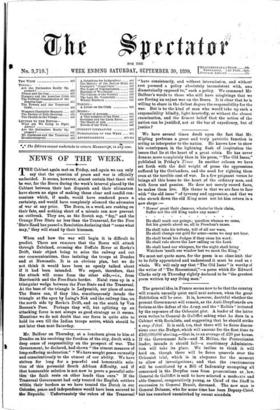We have several times dwelt upon the fact that Mr.
Kipling performs a great and truly patriotic function in
acting as interpreter to the nation. He knows how to show his countrymen in the lightning flash of inspiration the issues that lie at the heart of a great crisis. He has never done so more completely than in his poem, "The Old Issue," published in Friday's Times In another column we have set forth with the dull weight of prose the oppressions suffered by the Outlanders, and the need for righting them even at the terrible cost of war. In a few poignant verses he brings all this home to the heart of the ordinary man, and with force and passion. He does not merely record facts, he makes them live. His theme is that we are face to face with "the old issue" of tyranny and oppression, and that we who struck down the old King must not let him return in a new shape
" Howso' great their clamour, whatso'er their claim, Suffer not the old King under any name!
..... • He shall mark our goings; question whence we came, Set his guards about us, all in Freedom's name.
He shall take his tribute, toll of all our ware, He shall change our gold for arms—arms we may not boar.
He shall break his Judges if they cross his word : He shall rule above the Law calling on the Lord.
He shall heed our whispers, for the night shall bring Watchers 'neath our window lest we mock the King."
We must not quote more, for the poem is so close-knit that to be folly appreciated and understood it must be read as e whole. We will only say that "The Old Issue" is worthy of the writer of " The Recessional,"—a poem which Sir Edward Clarke only on Thursday rightly declared to be "the greatest poem written by any living man."






































